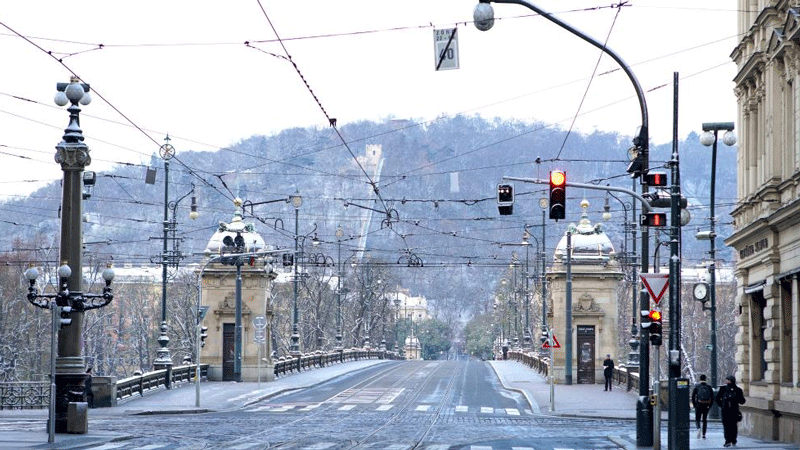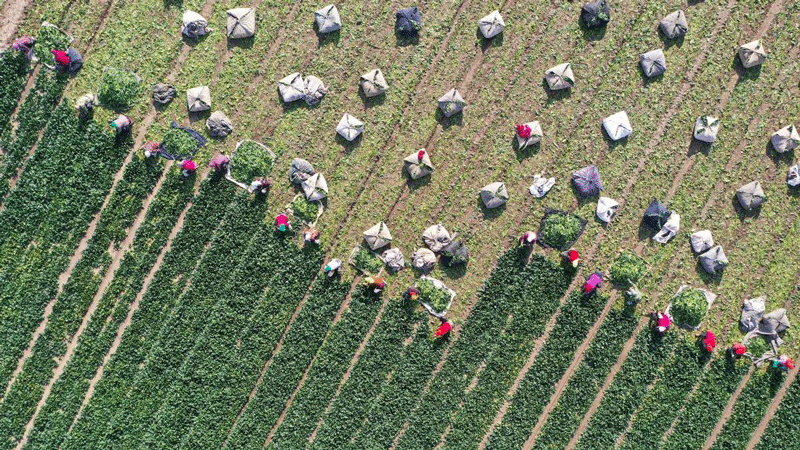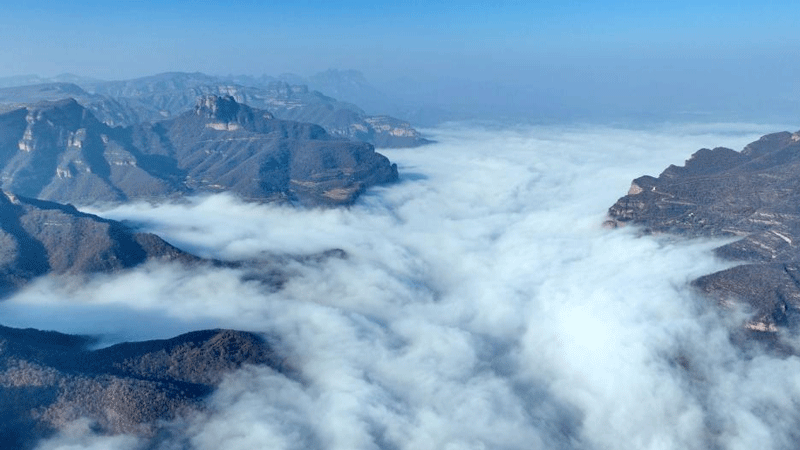Could Türkiye become gas hub for Europe?

Russian President Vladimir Putin (3rd L), Turkish President Recep Tayyip Erdogan (3rd R), Serbian President Aleksandar Vucic (2nd R) and Bulgarian Prime Minister Boyko Borissov (2nd L) attend the inauguration ceremony of the TurkStream project in Istanbul, Turkey, Jan. 8, 2020. (Xinhua File photo)
ANKARA, Nov. 20 (Xinhua) -- Türkiye is trying to make the most of its good geographic location to become an energy hub between Russia, world's leading exporter of natural gas, and the European market, even as the EU is seeking to reduce its reliance on Russia's energy after the latter's special military operation in Ukraine, but experts say this is a bumpy path filled with challenges.
"Türkiye is located in a place geographically ideal for supplying Europe with energy. Its transcontinental location is of great advantage," Kerim Has, a Moscow-based analyst on Russian and Eurasian affairs, told Xinhua.
Türkiye is home to seven international natural gas pipelines from the East to the West, and four LNG (liquefied natural gas) land-based terminals and floating storage units, all in the western part of the country.

The opening ceremony for the Trans-Anatolian Natural Gas Pipeline is held in Eskisehir Province, Türkiye, on June 12, 2018. (Xinhua File photo)
Has pointed to TurkStream pipeline, which runs directly from Russia to Türkiye's Thrace region through the Black Sea, as the best option.
"It is not currently used in full capacity and could provide Europe with some much-needed gas," he explained.
The Blue Stream, another major trans-Black Sea pipeline that has the capacity to carry 16 billion cubic meters of natural gas per year from Russia to Türkiye, may also be part of the infrastructure that could eventually make Türkiye a hub, Has noted.
Turkish President Recep Tayyip Erdogan said in October that he has agreed with his Russian counterpart Vladimir Putin on the proposal to build natural a gas hub in Türkiye, and Europe can secure its supply from the Turkish hub.
Erdogan's remarks came after the Nord Stream pipelines, which transport gas from Russia to Germany through the Baltic Sea, were damaged in a series of explosions in late September.
"With artful energy diplomacy and strategic vision," Türkiye could become a "middleman" in natural gas sales to Europe in the long run, as it already imports significant amounts of gas from other major producers such as Iran and Azerbaijan, Has said.
"Supplying the EU with Russian gas would give Türkiye strategic leverage in its ties with Europe, making it a secure energy corridor in the continent's time of need," the analyst said, adding it would potentially consolidate growing energy ties between Ankara and Moscow as well.

Russian President Vladimir Putin (R) meets with his Turkish counterpart Recep Tayyip Erdogan in Moscow, Russia, on March 5, 2020. (Sputnik/Handout via Xinhua)
TurkStream forks when reaching Türkiye, with one line supplying gas to Türkiye and the other going to Europe. Each line has an annual capacity of 15.75 billion cubic meters.
According to experts, the conduit could also be expanded with two new lines of a combined capacity of 31 billion cubic meters to supply European consumers by passing through the southeastern European countries of Bulgaria, Romania and Hungary, but it will need time and money.
Timing is more of a problem than the investment, according to independent energy analyst and consultant Ali Arif Akturk, who estimated the cost of building two additional pipelines for TurkStream over two years to be 10 billion U.S. dollars.
He is skeptical about the feasibility of the Russian idea under the current geopolitical circumstances, as Brussels is unlikely to give the green light to such a project.
"Currently the political and economic climate is not favorable to such a project. While there is a conflict raging in Ukraine, the risk of a recession in Europe and increasing global interest rates are real challenges," he told Xinhua.
In addition, the Turkish government may also refrain from making critical financial moves ahead of the general elections next year, Akturk added.

Aerial photo provided by the Swedish Coast Guard on Sept. 28, 2022 shows a gas leak on the Nord Stream 1 pipeline. (The Swedish Coast Guard/Handout via Xinhua)
Nevertheless, the Erdogan administration would draw up a road map to turn the country into a gas hub by the end of this year, Turkish Energy and Natural Resources Minister Fatih Donmez said in an interview with TRT Haber TV channel early this month.
In a video message to a gas delivery ceremony in the northern Black Sea province of Kastamonu, Erdogan said his government is taking steps to make Turkey a natural gas hub "where natural gases compete with one another, and the reference price is set in its region," according to a statement released by the Turkish presidency on Nov. 12.
Photos
Related Stories
- Türkiye strikes Kurdish groups in Iraq, Syria after Istanbul explosion
- Erdogan, Putin discuss bilateral, regional issues over phone
- Türkiye, Russia agree to send free grain to needy countries, says Erdogan
- Türkiye's energy hub ambition needs more countries than Russia to join: experts
- Egyptian, Greek FMs meet for talks after Türkiye-Libya gas exploration deal
- In pics: 4th World Nomad Games in Türkiye
Copyright © 2022 People's Daily Online. All Rights Reserved.









